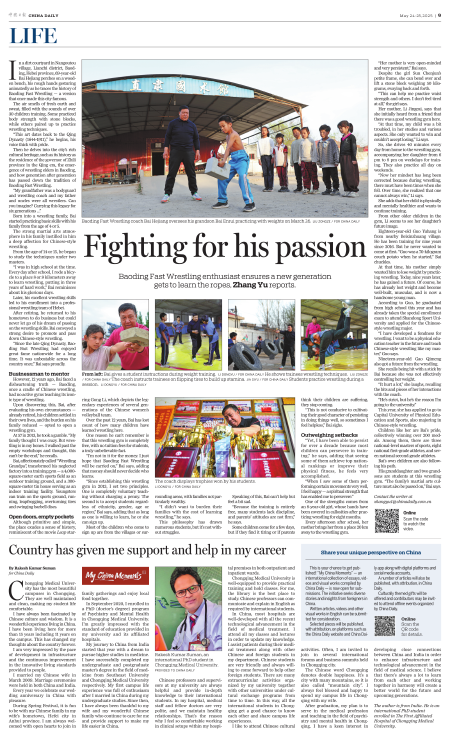
Online Scan the code to watch the video.
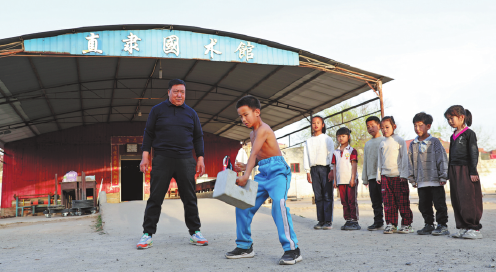
Baoding Fast Wrestling coach Bai Hejiang oversees his grandson Bai Enrui practicing with weights on March 26.
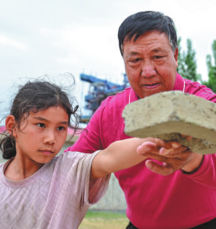
Bai gives a student instructions during weight training.
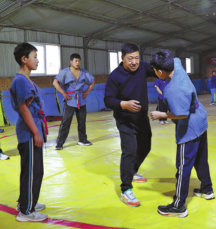
He shows trainees wrestling techniques.
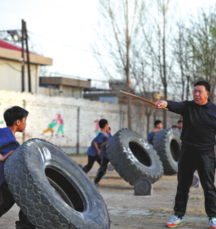
The coach instructs trainees on flipping tires to build up stamina.
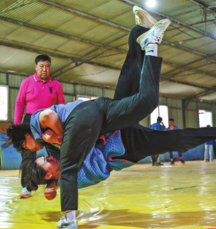
Students practice wrestling during a session.
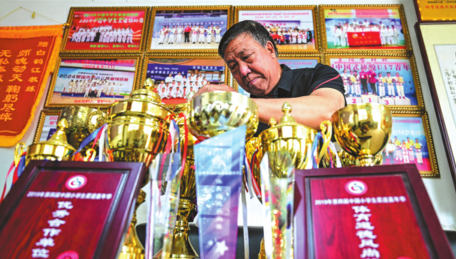
The coach displays trophies won by his students.
In a dirt courtyard in Nangoutou village, Lianchi district, Baoding, Hebei province, 69-year-old Bai Hejiang perches on a wooden bench, his rough hands gesturing animatedly as he traces the history of Baoding Fast Wrestling — a version that once made this city famous.
The air smells of fresh earth and sweat, filled with the sounds of over 30 children training. Some practiced body strength with stone blocks, while others paired up to practice wrestling techniques.
"This art dates back to the Qing Dynasty (1644-1911)," he begins, his voice thick with pride.
Then he delves into the city's rich cultural heritage, such as its history as the residence of the governor of Zhili province in the Qing era, the emergence of wrestling elders in Baoding, and how generation after generation has passed down the tradition of Baoding Fast Wrestling.
"My grandfather was a bodyguard and wrestling coach and my father and uncles were all wrestlers. Can you imagine? Carrying this legacy for six generations …"
Born into a wrestling family, Bai started practicing basic skills with his family from the age of 4 or 5.
The strong martial arts atmosphere in his family instilled in him a deep affection for Chinese-style wrestling.
From the age of 14 or 15, he began to study the techniques under two masters.
"I was in high school at the time. Every day after school, I rode a bicycle to a place 8 or 9 kilometers away to learn wrestling, putting in three years of hard work," Bai reminisces about his glorious days.
Later, his excellent wrestling skills led to his enrollment into a professional wrestling team of Hebei.
After retiring, he returned to his hometown to do business but could never let go of his dream of passing on the wrestling skills. Bai conveyed a strong desire to promote and pass down Chinese-style wrestling.
"Since the late Qing Dynasty, Baoding Fast Wrestling had enjoyed great fame nationwide for a long time. It was unbeatable across the country once," Bai says proudly.
Businessman to mentor
However, 12 years ago, Bai faced a disheartening truth — Baoding, once a cradle of Chinese wrestling, had no active gyms teaching its iconic type of wrestling.
Upon discovering this, Bai, after evaluating his own circumstances — already retired, his children settled in their own lives, and the burden on his family reduced — opted to open a wrestling gym.
At 57 in 2013, he took a gamble. "My family thought I was crazy. But wrestling is in my bones. I walked past the empty workshops and thought, this can't be the end," he recalls.
Bai, affectionately called "Wrestling Grandpa", transformed his neglected factory into a training gym — a 4,000-square-meter earth sports field as an outdoor training ground, and a 300-square-meter tin house serving as an indoor training facility. Youngsters can train on the sports ground, running, leapfrogging, overturning tires and swinging barbell discs.
Open doors, empty pockets
Although primitive and simple, the place exudes a sense of history, reminiscent of the movie Leap starring Gong Li, which depicts the legendary experiences of several generations of the Chinese women's volleyball team.
Over the past 12 years, Bai has lost count of how many children have learned wrestling here.
One reason he can't remember is that this wrestling gym is completely free, with no tuition fees for students, a truly unbelievable fact.
"I'm not in it for the money. I just hope that Baoding Fast Wrestling will be carried on," Bai says, adding that money should never decide who learns.
"Since establishing this wrestling gym in 2013, I set two principles. One is completely voluntary teaching without charging a penny. The second is to accept students regardless of ethnicity, gender, age or region," Bai says, adding that as long as one is willing to learn, he or she can sign up.
Most of the children who come to sign up are from the villages or surrounding areas, with families not particularly wealthy.
"I didn't want to burden their families with the cost of learning wrestling," he says.
This philosophy has drawn numerous students, but it's not without struggles.
Speaking of this, Bai can't help but feel a bit sad.
"Because the training is entirely free, many students lack discipline, and parents' attitudes are not firm," he says.
Some children come for a few days, but if they find it tiring or if parents think their children are suffering, they stop coming.
"This is not conducive to cultivating their good character of persisting in doing things well, so sometimes I feel helpless," Bai sighs.
Outweighing setbacks
"Yet, I have been able to persist for over a decade because most children can persevere in training," he says, adding that seeing some of them achieve top national rankings or improve their physical fitness, he feels very accomplished.
"When I saw some of them performing certain movements very well, I feel happy — a spiritual strength that has enabled me to persevere."
One of the strengths comes from an 8-year-old girl, whose hands have been covered in callosities after practicing wrestling for eight months.
Every afternoon after school, her mother brings her from a place 20 km away to the wrestling gym.
"Her mother is very open-minded and very persistent," Bai says.
Despite the girl Sun Chenjun's petite frame, she can bend over and lift a stone block weighing 50 kilograms, swaying back and forth.
"This can help me practice waist strength and others. I don't feel tired at all," the girl says.
Her mother, Li Jingcai, says that she initially heard from a friend that there was a good wrestling gym here.
"At that time, my child was a bit troubled, in her studies and various aspects. She only wanted to win and couldn't accept losing," Li says.
So, she drives 40 minutes every day from home to the wrestling gym, accompanying her daughter from 6 pm to 8 pm on weekdays for training. They also practice all day on weekends.
"Now her mindset has long been corrected because during wrestling, there must have been times when she fell. Over time, she realized that one cannot always win," Li says.
She adds that her child is physically and mentally healthier and wants to continue training.
From other older children in the gym, Li seems to see her daughter's future image.
Eighteen-year-old Guo Yuhang is from nearby Beixinzhuang village. He has been training for nine years since 2016. But he never wanted to come at first. "Guo was a 70-kilogram couch potato when he started," Bai chuckles.
At that time, his mother simply wanted him to lose weight by practicing wrestling. Today, nine years later, he has gained a future. Of course, he has already lost weight and become well-built, muscular, and is now a handsome young man.
According to Guo, he graduated from high school this year and has already taken the special enrollment exam to attend Shandong Sport University and applied for the Chinese-style wrestling major.
"I have developed a fondness for wrestling. I want to be a physical education teacher in the future and teach Chinese-style wrestling like my master," Guo says.
Nineteen-year-old Gao Qimeng also got a future from the wrestling.
She recalls being hit with a stick by Bai because she was not effectively controlling her weight.
"It hurt a lot," she laughs, recalling the bits and pieces of her interactions with the coach.
"He's strict, but he's the reason I'm going to the university."
This year, she has applied to go to Capital University of Physical Education and Sports, also majoring in Chinese-style wrestling.
Children like her are Bai's pride, collectively winning over 200 medals. Among them, there are three national-level masters of sports, eight national first-grade athletes, and seven national second-grade athletes.
Bai's own children are also following his path.
His granddaughter and two grandsons are students at this wrestling gym. "The family's martial arts culture must also be passed on," Bai says.
Contact the writer at zhangyu1@chinadaily.com.cn
